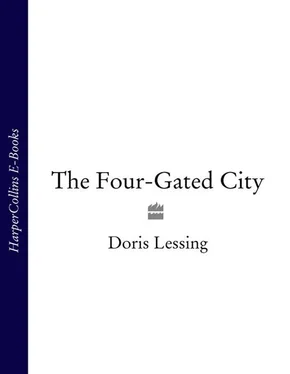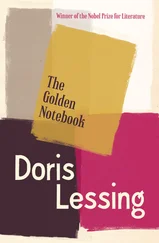Martha ought to buy something to wear. Imagining she had a hundred pounds to spend, she stalked clothes up and down the rich streets in Knightsbridge. But if she had had a hundred pounds, she would not have been able to spend a penny of it. The point was, she understood at last, that she did not know for whom, for what, she was dressing. If she had stayed in the streets across the river with Jimmy, Iris, and Stanley, with Stella and her clan, there would have been no problem: the working girls had a style and dash of their own. But it was only necessary to imagine wearing, with Henry, what they wore, to see its impossibility: a tight skirt, a shirt, a sweater: no, no, on to his face would come the look that meant that here was something attractive, and licensed – outside his codes. Was he aware of it? Probably not. Or, she could choose the uniform of a lady: plenty of these, unmistakable, in shops that sold nothing else. But she did not ‘fancy’ as Iris would say, that particular uniform. What then? For there were streets full of clothes, ‘utility’ from the war, hideous and dull and tasteless. For whom? Who were the men, the women, who deliberately sat down, and on to drawing-boards sketched such clothes?
No, not if she had a thousand pounds to spend, was there anything to buy – until she knew what she was going to have to be. Her suitcase in her hand, she dawdled, wasting time until it was one o’clock and time for Phoebe.
The restaurant off the Strand was a lower-level version of Baxter’s; a large room dotted with small tables each with four Windsor chairs. There were dull floral curtains, and wallpaper of a pinkish floral design. The standard to which both related was the same; somewhere behind both was a country house, or a large farm house: the country, at any rate, with centuries of a certain kind of taste behind it. If Fanny’s and Baxter’s had to do without paint or new curtains for fifty years, they would still present themselves to the world with impermeable self-esteem. The menu of Fanny’s offered the same kind of food, but plainer, without sauces, and much cheaper.
When Phoebe arrived, she nodded at the waiter, who knew her; and had inspected Martha thoroughly before even sitting down, though from different standards to Henry’s. Martha’s failure to ring up immediately she had arrived in London: and then, her unreliability, had confirmed, if not frivolity, at least a more fortunate experience than hers, Phoebe’s. Martha’s appearance underlined it. Phoebe wore a skirt and a rather dull jersey, and pearls. Martha wore a linen sleeveless dress on a day which was only by courtesy a summer’s day; and her appearance paid no homage at all to service. Also, her suitcase stood by the chair, after so many weeks in London. Before Phoebe had even sat down, she had made it clear that Martha was a disappointment. She ordered, while Martha followed suit: chicken soup, tinned; boiled fish in an egg sauce; steamed jam pudding. There was a stain on the tablecloth. ‘And how are you finding London?’
This, since it was Phoebe who asked it, was a serious question. Martha deliberated. To whom in the world could she say what she had found in London? Jack – perhaps. A little. And now, because it was Phoebe who sat there, opposite, the past weeks changed their aspect and presented ‘London’ to Martha as a series, containing dockland Stella, the café and Iris; Jack; Henry; and the people in the streets and pubs. Fragments. This was a country where people could not communicate across the dark that separated them. She opened her mouth to say: I am thinking a good deal about class … and shut it again, though Phoebe had seen her about to speak and still waited. It was nothing to do with class. In Africa, as a white, she was so and so; and if she had been black, must be such and such. There was something in the human mind that separated, and divided. She sat, looking at the soup in front of her, thinking: if I eat, if I start this routine of meals, sleep, order, the fine edge on which I’m living now is going to be dulled and lost. For the insight of knowledge she now held, of the nature of separation, of division (for any number of different sets of words would serve to state it, none being of any real use), was clear and keen – she understood, sitting there, while the soup sent a fine steam of appetite up to her nostrils, understood really (but in a new way, was in the grip of a vision), how human beings could be separated so absolutely by a slight difference in the texture of their living that they could not talk to each other, must be wary, or enemies.
Phoebe waited. She had never travelled out of England. Martha was a traveller. She wanted to know.
Class? Phoebe was dedicated to its abolition, presumably, as a stalwart of the Labour Party.
Martha picked up her spoon and started on the soup. ‘I think a great deal about food, for one thing,’ she temporized: feeling strongly that Phoebe deserved better than that.
Phoebe, let down, said, on a fine edge of rebuke: ‘Not very surprising, in the circumstances.’
The war having appeared in the wings of their meeting, it moved off again: Martha felt guilty. She had heard that Phoebe had had a bad time during the war. Her husband had been mostly away, except for leaves when the two little girls were conceived. The marriage had broken up. One of the little girls had been very ill. Phoebe had held a job in a government office, had fire-watched, had looked after the children, had been ill herself … One could not imagine Phoebe as anything less than admirable. Martha kept quiet.
‘I have just the right job for you,’ announced Phoebe at last, since Martha the traveller was silent. She was making a good many things plain in this one announcement. She was left-wing labour: but not so left that she did not regard some well-known left-wingers, her ex-husband for one, as ‘extreme’. She was bound by her position, to regard all communists with a greater hatred and suspicion than she would a Tory. Her sister Marjorie was – from her point of view – a communist; she was dangerous, dogmatic, wrongheaded. But this was the role that Marjorie had always played for elder sister Phoebe. Martha was a friend of Marjorie’s. But Mrs Van der Bylt in correspondence, in constant touch with a dozen of the organizations which Phoebe committee’d or secretaried or manned, had written offering Martha as a valuable recruit for the cause. Which meant that Martha’s degree of redness had been defined as tolerable – not only personally, as what Mrs Van and presumably Phoebe could stand, as people; but what others might be expected to stand. In an inflammable time. Not altogether complimentary that: Martha was not altogether sure she liked being so safe. Besides, whatever else she had learned in London, she was sure of one thing: anything her communist friends had told her of the poverty of the working people; of the blind selfishness of the middle classes (she hadn’t met the aristocracy, irrelevant, probably), was true. More than true. If she were going to have to be political, communism was nearer her mark than ‘Labour’ in its various degrees. Yet for days now she had been coming towards Phoebe, and knowing quite well that in doing so she was choosing her future. Her immediate future, at least. Well, one thing was certain. She was bound to be in a false position of one kind or another. That couldn’t be avoided. To what extent?
‘What kind of a job, Phoebe?’
‘We are going to start an organization for freeing the colonies, that sort of thing. A society or organization here, with the progressive movements there. And we need a secretary.’
‘I see.’
Martha considered Phoebe’s ‘We’. She was not in a position to define it.
‘A fairly broadly based thing.’
‘I see. Anyone who would support the objectives?’
Читать дальше












